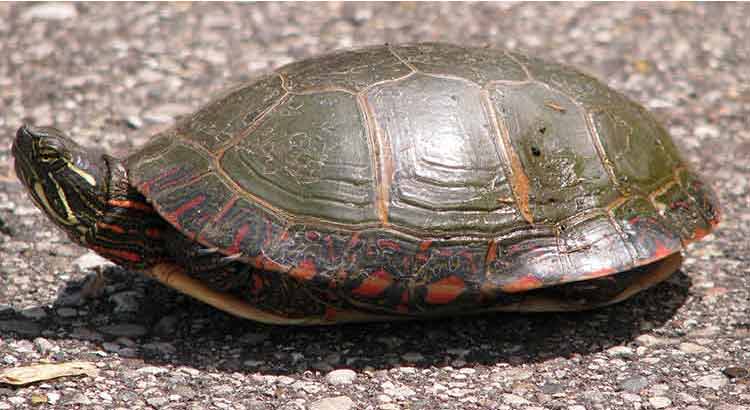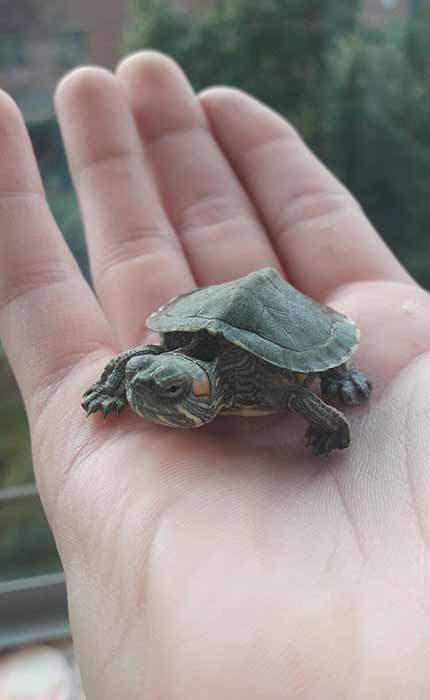Turtles love to eat, usually, they will eat everything that you put in front of them, and this includes vegetables. But just because they can eat them, it doesn’t mean that every vegetable is good for them. To find out which vegetables can painted turtles eat, I decided to do some research. Here is what I found out.
Painted turtles can eat almost every type of vegetable, the only ones that should be avoided are those with a high volume of phosphorus and those with little nutritional value.
Some of the best vegetables that you can feed your painted turtle are:
- Collards
- Spinach, Mustard
- Turnip Greens
- Lambsquarters
- Dill Weed
- Beet Greens
- Dandelion Greens
- Chinese Cabbage (pak-choi)
- Lettuce, Loose-leaf
- Mustard Greens
- Parsley
- Kale
- Chicory Greens
- Spinach
- Watercress
- Cabbage
- Endive (Escarole)
- Celery
- Purslane
- Cilantro
- Lettuce, Butterhead (Boston, Bibb)
- Okra
- Swiss Chard
- Turnip
- Squash (Winter, all varieties)
- Green Beans
- Lettuce, Romaine
- Sweet Potato
- Rutabaga
- Broccoli
- Cucumber (with skin)
- Endive, Belgian (Witloof Chicory)
- Carrots
- Squash (Summer, all varieties)
- Brussels Sprouts
Almost every vegetable will benefit your painted turtle, but as I said some of them have very little nutritional value so they won’t do too much good for your turtle, and others have too much phosphorus which can actually be bad for turtles. So let’s take a closer look at which vegetables are bad for your painted turtle.
Vegetables That Don’t Benefit Painted Turtles
There are a few vegetables out there that contain little to no nutritional value for painted turtles. In general, vegetables are regarded as great food sources that can help any person maintain good health, but turtles don’t benefit the same way from vegetables as we do. Some of the vitamins and nutrients from vegetables help people remain healthy to have little to no beneficial effect on turtles.
Some of those vegetables are iceberg salad, cucumbers, eggplants, and some mushrooms. There are other vegetables that do little to no good for the health of the turtle, but I only listed a few of them because this way it will be easy to remember, and they are also some of the vegetables that you are very likely to encounter at most stores.
While those vegetables don’t actually harm painted turtles, they only manage to fill their stomachs, but don’t provide too much nutritional value. So it would be better to just give your turtle something else instead. For example, instead of giving your painted turtle iceberg salad, you could give it green leaf salad which contains a lot of beneficial nutrients, and it’s actually loved by most turtles.
If in the past you used to feed your painted turtle some of those less nutritional vegetables, there is no problem, as I said they won’t harm your turtle. But from now on you should give them some better vegetables.
Now let’s move to the other types of vegetables that aren’t good for painted turtles, those with a high amount of phosphorus.
Vegetables That Can Harm Your Painted Turtle
Almost all vegetables contain calcium and phosphorus. And as a result, most of them have a calcium to phosphorus ratio. So let’s take a look at what calcium does for painted turtles, what phosphorus does for them, and what a good calcium to phosphorus ratio is.
Calcium is essential for every animal in this world that has bones. And since the shell of a turtle is made out of bones, the calcium is even more important for turtles than for any other animal. Vegetables are one of the main sources of calcium that a painted turtle has, so making sure that you feed them vegetables with high amounts of calcium is important.
For humans phosphorus is a very important mineral that helps filter waste, repair tissue and cells, etc. But for turtles phosphorus is not that great. Phosphorus is what gives turtle shells a little flexibility, which is great because this little extra flexibility makes them more resistant to bites and other types of impact. But too much phosphorus can also make the shell a lot softer, and as a result much weaker when it comes to defending the turtle from predators.
In short, we can say that calcium is great for turtles and phosphorus is not so great for turtles in high quantities.
Most vegetables have a calcium to phosphorus ratio, this ratio can be 1:1, 2:1, 5:1, 1:2, etc.
A 1:1 ratio means that the amount of calcium is equal, or almost equal to the amount of phosphorus. So a vegetable with this ratio is not that great for turtles, but it’s not harmful either. But if possible such a vegetable should be avoided.
A 1:2 calcium to phosphorus ratio is really bad, there are not many vegetables with this ratio, so don’t worry too much about them. Just remember that if a vegetable has more potassium than calcium you should keep it away from your turtle.
A 2:1 ratio is great, and this is what you should be aiming for, if the ratio goes higher it’s ok, but ideally this is the ratio that you are looking for.
Here is a list of some of the most common vegetables and their Calcium to Phosphorus ratio:
| Vegetable | Ratio |
| Collards | 14.5:1 |
| Spinach, Mustard | 7.5:1 |
| Turnip Greens | 4.5:1 |
| Lambsquarters | 4.3:1 |
| Dill Weed | 3.2:1 |
| Beet Greens | 3.0:1 |
| Dandelion Greens | 2.8:1 |
| Chinese Cabbage (pak-choi) | 2.8:1 |
| Lettuce, Loose-leaf | 2.7:1 |
| Mustard Greens | 2.4:1 |
| Parsley | 2.4:1 |
| Kale | 2.4:1 |
| Chicory Greens | 2.1:1 |
| Spinach | 2.0:1 |
| Watercress | 2.0:1 |
| Cabbage | 2.0:1 |
| Endive (Escarole) | 1.9:1 |
| Celery | 1.6:1 |
| Purslane | 1.5:1 |
| Cilantro | 1.4:1 |
| Lettuce, Butterhead (Boston, Bibb) | 1.4:1 |
| Okra | 1.3:1 |
| Swiss Chard | 1.1:1 |
| Turnip | 1.1:1 |
| Squash (Winter, all varieties) | 1.0:1 |
| Green Beans | 1.0:1 |
| Lettuce, Romaine | 0.8:1 |
| Sweet Potato | 0.8:1 |
| Rutabaga | 0.8:1 |
| Broccoli | 0.7:1 |
| Cucumber (with skin) | 0.7:1 |
| Endive, Belgian (Witloof Chicory) | 0.7:1 |
| Carrots | 0.6:1 |
| Squash (Summer, all varieties) | 0.6:1 |
| Brussels Sprouts | 0.6:1 |
| Cauliflower | 0.5:1 |
| Kohlrabi | 0.5:1 |
| Pumpkin | 0.5:1 |
| Alfalfa Sprouts | 0.5:1 |
| Parsnips | 0.5:1 |
| Peppers, Green | 0.5:1 |
| Peppers, Red | 0.5:1 |
| Sweet Potato Leaves | 0.4:1 |
| Beets | 0.4:1 |
| Asparagus | 0.4:1 |
| Tomato | 0.2:1 |
| Corn, White | 0.02:1 |
With the help of this table, you should be able to get a general idea of what vegetables you should feed your painted turtle. I personally like to feed my painted turtle Greenleaf and Redleaf salad, they are not too expensive and he seems to like it. And when I’m cooking something with vegetables is usually cut a couple of smaller pieces and feed them to my turtle, just to mix things up a little.
Another short thing that I want to cover in this article is what to do if your painted turtle doesn’t eat the vegetables, this can happen a lot, especially if they are babies, juveniles or if they are just not used to eating them.
What to Do If Your Painted Turtle Doesn’t Eat Vegetables
The first thing that you have to do is to determine the cause. And there are two possibilities.
The first possibility is that your turtle is too young. It’s not uncommon for baby and juvenile painted turtles to not eat vegetables. When they are at those life stages they are growing a lot faster than adult painted turtles, and to grow this fast they need a lot of protein that they get from meat. So eating vegetables or anything else won’t do them any good. If your painted turtle is you then it’s perfectly normal that it won’t eat vegetables. Just wait until it reaches maturity, then you can try again to feed it vegetables.
If you are not sure how old is your turtle, then read this article: How Long do Turtles Live? there you will find a few methods that will help you approximate the age of your turtle.
The second possibility is that you got your turtle used to eat only meat, pellets, and similar things, and now it doesn’t want to eat anything else. But fortunately, this is a common problem that has a simple situation. You just have to stop feeding your turtle so much meat and pellets, and start giving it vegetables as well. Start by reducing the amount of food that you give it and replacing it with vegetables. If it still doesn’t eat replace more of its food with vegetables.
Do this until it starts eating the vegetables. Don’t worry about starving your turtle, in the wild, they are used to going for entire months without food, and you are not taking all the food away, you are still giving it the possibility to eat a lot of food. The only reason it doesn’t eat is that it’s used to other types of food, that is not as healthy, but a lot tastier.
After a couple of weeks or a month of using this method, your painted turtle will start eating vegetables soon enough, and in the end, it will also start to enjoy some of them.
Related Questions
Can turtles eat fruits? Yes, turtles can and should eat fruits. Fruits provide a lot of important vitamins and nutrients that keep turtles healthy.
What is the best food for turtles? There is nothing out there that can be named the best food. Instead, the best thing that you can feed your turtle is a balanced diet, that contains pellets, fruits, vegetables, and meat.
Can turtles eat pasta? Turtles can eat them, but they shouldn’t. Pasta contains little to no nutritional value for turtles, and it can cause digestive problems. So keep pasta away from your turtles.


